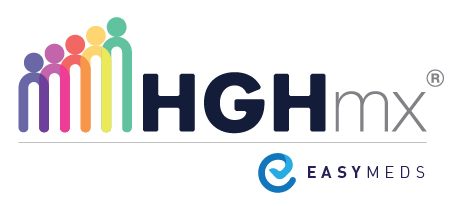Aging is an inescapable reality, a multifaceted process shaped by genetics, lifestyle choices, and environmental influences. Among the numerous factors that contribute to aging, hormones such as Insulin-like Growth Factor 1 (IGF-1) and Natural Human Growth Hormone (Natural HGH) hold substantial importance. Gaining a deeper understanding of these hormones, particularly Natural HGH, can provide valuable insights into the aging process and potential ways to alleviate its effects. This article delves into the lifecycle of IGF-1 and Natural HGH, their influence on aging, and the prospect of hormone therapy as a viable anti-aging strategy.
Timeline of IGF-1 Levels and Natural HGH Production
- Prenatal Stage: The production of Natural HGH and IGF-1 begins in the womb. These hormones play crucial roles in the growth and development of the fetus.
- Childhood: During early childhood, the production of these hormones continues to increase. They are essential for normal growth, particularly during growth spurts.
- Adolescence: The production of Natural HGH and IGF-1 peaks during adolescence. This is when the body experiences rapid growth and development, both physically and mentally.
- Early Adulthood: In our early adult years, the production of these hormones starts to stabilize. They still play significant roles in maintaining muscle mass, promoting cell repair, and supporting overall health.
- Middle Age: As we enter our middle-aged years, the production of Natural HGH and IGF-1 begins to decline. This can result in slower metabolism, decreased muscle mass, and other age-related changes.
-
Senior Years: In our senior years, the production of these hormones drops significantly. This can lead to more pronounced effects of aging, but maintaining healthy lifestyle habits can help mitigate some of these effects.
How the Decline of Natural HGH Production Affects Signs of Aging
- Skin Elasticity and Wrinkles: Reduced HGH levels contribute to a loss of skin elasticity, leading to wrinkles and sagging skin.
- Muscle Mass and Strength: Lower HGH and IGF-1 levels make it harder to maintain muscle mass, resulting in decreased strength and stamina.
- Bone Density: The decline in these hormones can lead to reduced bone density, increasing the risk of fractures.
- Metabolism and Weight Gain: Lower levels of HGH can slow down metabolism, contributing to weight gain and obesity.
- Cognitive Function: Some studies suggest that reduced HGH levels may be linked to cognitive decline, although more research is needed.
- Immune System: Lower levels of these hormones can weaken the immune system, making one more susceptible to infections.
Is HGH Natural?
HGH, or human growth hormone, is a naturally occurring hormone in the human body. It is produced by the pituitary gland, which is located at the base of the brain. HGH plays a crucial role in growth and development, particularly during childhood and adolescence.
In its natural form, HGH is released in pulses throughout the day, with the highest levels occurring during sleep. It helps regulate body composition, muscle and bone growth, metabolism, and tissue repair. However, as we age, the production of HGH decreases, leading to various age-related changes.
While HGH is indeed natural, it has also been synthesized in laboratories and is available as a medication. Synthetic HGH is commonly used for medical purposes, such as treating growth hormone deficiency in children and adults, and certain medical conditions. It is important to note that the use of synthetic HGH without a prescription for non-medical purposes can have serious health risks and is illegal in many countries.
There are also products in the market claiming to be “natural HGH boosters” or “HGH releasers.” These products often contain a mix of amino acids, vitamins, and other substances believed to enhance the body’s natural production of HGH. However, the effectiveness and safety of these products are still a subject of debate in the scientific community.
Does Taking HGH Stop Natural Production?
The impact of taking HGH (human growth hormone) on natural production is a commonly asked question, and the answer can vary. Some sources suggest that taking exogenous (external) HGH may suppress the body’s natural production of growth hormone. However, this is not universally agreed upon.
According to a source from HGH Therapy Doctor, when you stop taking HGH, your body may experience a decrease in growth hormone levels, but it is possible for natural production to resume over time. Similarly, HealthGains states that patients receiving HGH treatment for growth hormone deficiency are unlikely to experience withdrawal symptoms or a complete halt in natural production.
Cleveland Clinic explains that once the growth plates in bones have fused, HGH no longer increases height, but the body still requires HGH for other functions. However, abruptly stopping growth hormone injections can cause a shock to the body and potentially affect energy levels.
It is important to note that excessive and prolonged use of HGH can lead to health risks, including irreversible conditions like acromegaly. Furthermore, the Mayo Clinic states that there is little evidence to support the claim that HGH can help otherwise healthy adults regain youth and vitality.
What Are Some Natural HGH Supplements?
Various supplements claim to boost HGH levels, such as amino acid blends, herbal concoctions, and certain vitamins. However, the efficacy of these supplements is not universally supported by scientific evidence. Here are a few you may have heard of:
- GenF20 Plus: This is a potent all-natural formula that tops many lists of the best HGH supplements.
- Arginine supplement: Arginine is an amino acid that may boost HGH when taken alone.
- HGH-X2: This is a natural HGH supplement that can be obtained without any prescription. It helps to naturally increase growth hormone levels.
- Provacyl: A completely natural testosterone and HGH-booster that helps men improve multiple aspects of their health, including stimulating libido.
- Glutamine-rich food: Glutamine is a powerful amino acid that can cause a significant increase in HGH levels, even at small doses.
What Are Some Natural Sources of HGH?
Certain lifestyle choices, habits, and foods can help boost the body’s natural HGH production.
Here are some ways to naturally increase HGH levels:
- Lose Body Fat: High amounts of body fat, particularly around the belly, can lower HGH production.
- Intermittent Fasting: This can help optimize HGH levels by reducing body fat and lowering insulin levels.
- Arginine Supplement: Consider taking an arginine supplement, as it may increase HGH levels.
- Reduce Sugar Intake: High sugar intake raises insulin levels, which may reduce HGH production.
- GABA Supplement: A neurotransmitter that helps nerve impulses communicate, GABA supplements may help increase HGH levels.
- Tryptophan-rich Foods: Foods such as eggs, milk, beans, and meat can naturally boost HGH levels.
- Glutamine-rich Foods: Foods like spinach, meat, eggs, fish, and beans can increase HGH levels.
- Melatonin-rich Foods: Foods like raspberries can increase the release of HGH by up to 157%.
- Essential Amino Acids: Poultry, fish, beans, nuts, seeds, and wheat germ are rich dietary sources of essential amino acids that can increase HGH
- High-Quality Proteins: Foods such as chicken, fish, eggs, and tofu, when consumed with healthy fats, can boost HGH levels.
- Grass-fed Beef: It provides great amino acids, including L-Ornithine, L-Leucine, L-Valine, L-Glutamine, and L-Arginine, which stimulate HGH production.
What Are Some Natural Ways to Increase HGH?
- Exercise and Physical Activity: High-intensity interval training (HIIT) has been shown to increase HGH levels.
- Sleep Optimization: Quality sleep is crucial for various hormonal cycles, including HGH production.
- Stress Management: Practices like meditation can reduce cortisol levels, indirectly promoting HGH production.
- Dietary Changes: Intermittent fasting and reducing sugar intake can also help.
Natural HGH Foods
- Amino Acid-Rich Foods: Chicken, fish, dairy, and legumes
- Sleep-Promoting Foods: Almonds, turkey, and chamomile tea
- Stress-Reducing Foods: Green tea, citrus fruits, and dark chocolate
- Liver-Supporting Foods: Leafy greens, garlic, and beets
GH Therapy for Anti-Aging
Growth Hormone (GH) Therapy, specifically using Human Growth Hormone (HGH), has gained attention as a potential anti-aging treatment. The therapy involves injecting synthetic HGH to supplement the body’s natural production, which typically decreases with age.
History of GH Therapy
The use of GH therapy started in the 1950s to treat children with growth failure due to GH deficiency. However, it was not until the 1990s that GH therapy began to gain attention for its potential anti-aging properties. This followed a study by Dr. Daniel Rudman published in the New England Journal of Medicine, where he injected 12 men aged from 60 to 81 with HGH three times a week for six months.
Dr. Daniel Rudman’s groundbreaking study in the 1990s brought GH therapy, particularly the use of Natural HGH, into the spotlight for its potential anti-aging properties. In his research, published in the New England Journal of Medicine, he administered HGH injections to a group of 12 men, ranging from ages 60 to 81, three times a week over a period of six months.
The results of the study were intriguing. The participants demonstrated significant improvements in body composition, including an increase in lean body mass and a decrease in adipose tissue. Moreover, the men experienced a rejuvenation in skin thickness and increased bone density, particularly in the lumbar spine. These outcomes suggested that HGH injections had the potential to reverse certain aspects of aging.
However, it’s important to note that while these results were promising, further research was needed to fully understand the long-term effects and potential risks associated with GH therapy. This study served as a springboard for ongoing investigations into the role of hormones like Natural HGH in the aging process, with recent studies exploring the benefits of natural ways to boost HGH levels, such as through diet and lifestyle changes (source: Rudman D, et al. “Effects of Human Growth Hormone in Men over 60 Years Old.” NEJM, 1990).
Effects of GH Therapy
GH therapy is known to have several effects. Adults with GH deficiencies can benefit from the injections, experiencing protection from fractures, increased muscle mass, and improved exercise capacity. It can also reduce adiposity and increase lean body mass. However, it’s important to note that the use of HGH for anti-aging purposes is not FDA-approved.
While some signs of aging are similar to symptoms of growth hormone deficiency, current evidence suggests that HGH may not be a suitable anti-aging treatment. Among endocrinologists, there are concerns that GH therapy is being prescribed to older adults, potentially ignoring serious risks.
Celebrity Use of GH Therapy
Several celebrities have spoken about their use of GH therapy. Hollywood actor Sylvester Stallone, for example, has publicly admitted to using HGH and testosterone supplements to help maintain his physique and energy levels.
Despite the potential benefits, it’s crucial to remember that GH therapy can have side effects and risks, including joint pain, carpal tunnel syndrome, and an increased risk of diabetes and heart disease. Always consult with healthcare professionals before starting such treatments.
Conclusion
The lifecycle of IGF-1 and HGH significantly impacts the aging process. While natural declines in these hormones contribute to aging signs, interventions like lifestyle changes and potentially hormone therapy offer some promise. However, it’s crucial to approach these options with a balanced view, considering both the potential benefits and risks.







